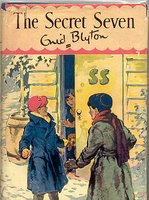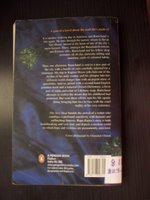Riot by Shashi Tharoor
Genre: Politics/Religion
Story line: Begins with an American student killed in a communal riot in India, and deals in detail with the riot’s background and the student’s personal life.
The plot runs back and forth in time, and is a mix-up of excerpts mainly from the characters’ personal diaries. What I found baffling was that among the cleverly arranged newspaper clippings, diary scribbling, scrapbook pieces, notebook accounts, letter exchanges, journal sections and recorded tapes, the author has placed some blunt and obscure addendums like Lakshman to Priscilla and Prof. Sarwar to Lakshman. Now, what the X to Y actually stands for is a big misnomer for the readers who begin to doubt their standing as third-person observers. Are these the author’s own narrations? Or overheard conversations, maybe? Confounding…
A stickler to Wilde’s philosophy of “form being more important that content”, Tharoor takes care and makes sure that he changes the font, size and formatting of the text every time. This would not have been an essentiality, as the characters are required to speak for themselves; moreover, it proves to be a versatile distraction. Also, I did not get the implications in changing the v’s to w’s and w’s to v’s in the transcript of the interview of Shankar Das. If the idea was to convey that the man’s English was thickly Indian-accented, it was a very sore point. But for all these weaknesses, the format helped put across the plot so forcibly that in the beginning few pages, I could actually hear [a step ahead of visualizing] sirens blaring, babies crying, fires glaring and shop closing, curfewed after[riot]math itself. Half my review has been about the “form” rather than the “content”, owing to the author’s own prioritization.
Spoiler begins. Those reading this must mostly be the ones who turn to the last page of murder mystery novels. So, here goes your excitement down the drain: there is no suspense which is going to unwind and spring surprises on your face; there is no particular cold-blood-murderer zeroed at and punished for his brutal act, and the end of the book is as inconclusive as the start. This, according to me is the best thing about the novel, and I know many of you might disagree with me. In fact, jumping back to commenting about the formatting technique, I like the way in which the novel ends with a [continued] newspaper clipping, producing the required dramatic effect in abundance. Spolier ends.
The best read of all personal diaries to me was Katherine Hart’s. Be it describing how she felt sitting next to her ex-husband on flight, wondering how “her baby” had coped in an Indian-style squatting toilet, or defending when her dead daughter’s Indian interests are insulted by her co-worker Kadambari :- the character shines and so does the writing in these parts. But why she does not pursue investigations even after her assertion about the daughter's love/lust life is a mystery. Rudyard Hart, fresh from mourning his daughter’s death, talks more about his passionate infidelities and less about his dear child’s mysterious departure, in a drunken state. Though it helps in keeping the story moving, it fails to glorify the actual motive in his trip across the globe.
Lakshman’s explanation of why and how he believes in Hinduism is a good read. Religious [for that matter, any] fundamentalists are usually expert speakers, convincing the listener of what they call “the truth”. The author holds a strong fort here, and the non-exaggerated ramblings of the Hindu extremist Ram Charan Gupta, hits the bull’s eye. Randy Diggs, introduced as the impatient but witty reporter, could have been afforded a more elaborate character sketch, and his perspective [apart from the interviews] would have provided an interesting insight since he is the one who meets all the characters that are living.
The novel definitely has some intelligent remarks scattered throughout, many with an undeniable undertone of sarcasm:
The Indian government has apparently become rather good at managing these riots, and people like Mr. Lakshmanan [District Magistrates] are trained at riot control the way a student is trained to footnote a dissertation.
…Mrs. Gandhi ended her state of emergency and called an election… She had been a dictator, for all practical purposes, for twenty-two months she’d ruled under emergency decrees, and here she was, allowing the victims of her dictatorship the right to decide whether she could continue her tyranny.
Everything is recycled in India, even dreams.



